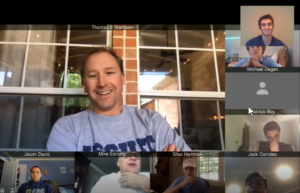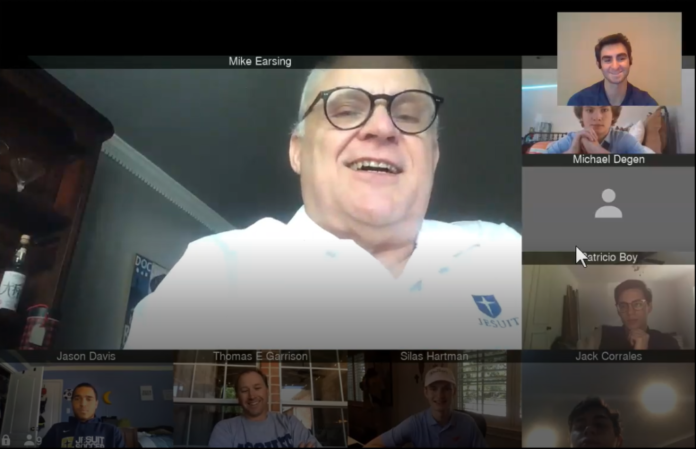The Roundup hosted a virtual conversation with Jesuit President Michael Earsing and Principal Tom Garrison last week to learn more about how Jesuit has navigated the decision-making process during this unprecedented time. The interview was rather lengthy, so without further ado:
How do you think students and faculty have adjusted to Covid-19?
Mr. Earsing: We have a Covid-19 task force team that we’ve been working on since before we closed school. I think everybody is rising to the occasion. I think everybody misses everybody. The biggest thing I think this is going to do is allow us to appreciate the mundane existence of everyday life. You’re at Jesuit and you think to yourself, ‘I’ve got to get up at 4:30 in the morning. I’m tired, and I have too much to do.’ I think this is going to be a sort of cold splash of water. Now, people will be like, ‘I’m ready. I’ll come at 3:00 in the morning, and I’ll get there early.’
It’s going to really highlight how much we love each other and just being together. We’re a very great community, but we’re a very tactile community. We’re bumping into each other in the hallway and shaking hands and giving the bro-hug all the time, we’re always in conversation with each other. I now see Mr. Garrison now virtually more than I did when he was at Jesuit, but there’s something that I miss about stopping by Mr. Garrison’s office for a couple of seconds and harassing him.
Mr. Garrison: Absolutely! This morning, about 20 of us got together with faculty for a coffee chat and it was only a half-hour. As we got to the 29th minute, I can tell that nobody wanted to leave yet. We had other meetings and stuff to get too, but I think that people are hungry for interactions with each other, and it could be about anything like the curriculum, the weather, or your dog. I think people are missing talking to each other. The part I think is hard adapting to this is, like Mr. Erasing said, popping into someone’s office or classroom and seeing him in the cafeteria before, but now you have to coordinate when you’re going to talk.
I know that the faculty are feeling that kind of pressure to coordinate with multiple people at multiple times and we just miss you guys. You all make it pretty interesting, amusing, and fun throughout the day.
Have there been any positive takeaways from dealing with the outbreak?
Mr. Garrison: This is going to sound weird, but this has been an exercise in learning how to listen for me. When we talk to each other, I never realize how much I use my hands and how much I gesticulate and look for responses from the person I’m talking to. A lot of times, the person you’re talking to doesn’t have their camera on or it’s a slow connection. I’ve had to practice listening very carefully, and I think that’s something that we’ve talked about.
The faculty are looking for other ways to listen to what you guys are experiencing that are different from what we normally would do. If you walked into my classroom, kicked the trash can, and threw your books on the floor, it’d be obvious something’s wrong. I’d ask you what’s wrong and we’d talk about it, but I don’t get to see you walk into the room. I don’t get to see you moving throughout the day. It’s like trying to sharpen a different sense. We can’t see you, so we have to listen better or use different senses. From a teachers standpoint, people are bringing more intentionality to the meetings, because they have to make a plan to get to the meeting and be there in that moment. Sometimes, those meetings were just half of the walk out of my office and I’d bump into somebody and it wasn’t really planned because we just had that moment. I think the faculty are having similar experiences, as they planned classes together. My guess is that when we get back, face-to-face in the building, we’re going to be better at communicating with one another. We have to work harder right now to listen and hear each other. So, if it’s like lifting weights and you lift heavy, the lighter stuff is easier.
Mr. Earsing: Mr. Garrison makes some good points on that. The other thing I’d thing I’d add with that is that I’ve also found that a lot more people are reaching out to make a connection with me. People have been reaching out wanting just to talk. It happens normally, and I’ve also been reading a lot. I’ve had someone call from the class of ‘85. He talked about his family and what’s going on. There’s much more intentionality about doing it now because I think that the idea about being together is a real need for human beings and certainly for God’s judgment.
For either of you, has there been anything comparable or similar in your past that prepared you for this?
Mr. Earsing: What? When the Black Death came, that was about the same thing. Mr. Garrison?
I think we were as prepared as we could be for this. With the uncertainty of not knowing what will be evolving with social distancing. I think 9/11 would have probably been the closest crisis we had to deal with then.
Mr. Garrison: Well, when some of you guys were freshmen when the flu closure happened for two days. I was trying to think of something that was so sudden; it was kind of a weird thing when we had to close for that. I’ll tell you the biggest thing that I can compare it to, and it’s not exactly our experience, was when Hurricane Katrina happened and New Orleans was kind wiped out for a time. We woke up one day and New Orleans students were literally showing up on the front doors of Jesuit because they had a family member or friend in Dallas. So when they evacuated New Orleans, they came to Dallas and we picked up about 75 students at the time, maybe even more than that.
Mr. Earsing: When this is going on, that was my reflection, “This must be what it was like for New Orleans, except the whole country is going through it right now. Those guys in New Orleans literally just left their school and stayed for a month or longer. This ranks up there with major catastrophes in my mind as far as closing the building or every school building in the town or the country. You know that brings up one more thing to what we’re talking about. We’re going to come out of this on top of this stronger than we were before because I think it’s too easy to listen to that spirit of consolation. Hats off to Mr. Garrison and the rest of the team and staff guys about not listening to the consolation and maintaining a positive attitude. It’s out there, and I think it’s all inside of our brains.
Going back to when school was still open, when and how did you make the decision to close the school down?
Mr. Earsing: It’s a complicated problem to solve. Obviously, we have to be sensitive to what the county in the state tells public schools, but we’re not a diocesan school, so we don’t necessarily always follow what the diocese wants schools to do. The biggest thing for us is you guys. We do what we can to make the students safe, we reacted fairly quickly with the hand sanitizing, washing hands and disinfecting the school. Typically nobody comes out and says, ‘you guys are closed.’
The diocese can close Bishop Dunne or Bishop Lynch, but Jesuit welfare is in our own hands. We have a lot of time to make decisions and take responsibility by making sure you guys are safe. Another thing, if you remember that day before spring break, the concern was that there was a case in our immediate Community–not in the Jesuit Community, but within schools nearby where we have a lot of overlap.
Especially since you guys are in the media, this thing is real and it’s scary, but it’s sometimes very hard to tell how scary it is and how real it is depending on what channel you’re watching or what paper you’re reading. I can open up one publication that says it’s all fine and this is over reaction and we should open everything up today, and I could open up another that says we should never open up again and everyone needs to stay in their homes. I’m exaggerating, of course, but we’re always looking for where the middle and most reasonable approach is.
Maybe we could have stayed open the couple days before spring break, but that might not really have been the reasonable thing to do. It gave us some time to kind of get you guys geared up and ready to go, as we went to Spring Break, not knowing how long will be closed at that time.
How do you balance considerations when deciding to cancel or postpone school and other extracurricular events like prom and graduation?
Mr. Earsing: Well, I want to be careful about this because we haven’t canceled everything. We’ve been trying to postpone as much as we can because I don’t think it’s good psychologically to say, “Everything’s canceled for the next three years” versus, “Let’s be realistic about what we can do and what we can’t.”
We’ve been trying to take the realistic approach about what we can actually do and what it looks like we’re going to be able to do. The 11 members on the covid task force group meet busily in small groups for what seems like three or four times a day, at least once a week for sure.
We talk about how everybody has a chance to voice their concerns, and we’re working up to different things, like: ‘What does graduation look like under A circumstance? Graduation under B circumstance? Graduation under C circumstance?’
We have the Celebration Auction, which is crucial for scholarships for financial aid. You’ve had the JWA passing the baton from the previous JWA president. We haven’t been able to do Senior Convocation or Special Games, and all the things that we normally do, but we’re trying to take up each task individually, saying, “Can we accomplish the goal of this event? What would it be?”
What kind of ideas or activities do you guys have for the seniors to bring back the spirit of brotherhood that has been lost while we’re at home?
Mr. Garrison: Well, I’ll start real quick. To Mr. Earsing’s point about graduation, I had a thought while he was talking about that. I’d like to go back and look at my calendar for the last two weeks and figure out how many hours we’ve devoted to talking about graduation. It’s a lot, just between, “What venue? What will the rules be? How will we do it? When will we do it? What will change?”
There’s going to be more mental bandwidth to talk about some other things that are going on. For example, signs were delivered to all the seniors. It was not something that got them face-to-face together, but it was something that at least got some symbolism. Everybody has the sign that’s in front of their house right now for that class of 2020. What I think is going to be happening is as we lock in these things, we must find answers on how we’re going to start looking for more space to be creative. As they’ve talked about loosening restrictions, every time we get a new variable, we have the opportunity to start being more creative in different ways. Prom was brought up earlier in the last question, which we had pushed back.
It wasn’t widely discussed, and I don’t know if you guys even knew this, but we identified an alternative date for prom and were ready to go with that. The problem was the closure extension to the end of May knocked that date out as well. So, we’re in a really weird balance where we can’t plan too far ahead because we don’t know what the rules are going to be when you get there, but as the rules change, we have to make some more plans. We’ve been representative that your peers have ideas. We are open to hearing them and seeing what’s on people’s minds.
How are you ensuring that everyone is being represented on this task force? How did you decide who would be included?
Mr. Earsing: Typically, it’s the senior leadership of the school. I have a cabinet called the President’s Cabinet, so we have that group, plus we’ve added other people that are from Mr. Garrison’s admin team. For example, Mr. Knize is in that group because he’s in charge of student life. He’s getting ideas and talking to the students. I also have liaison with the parents, and we talked to different parents as well. When it comes down to it, the school administration and the senior leadership of the school are responsible because we’re the ones who are responsible for that when something happens with you guys.
Have you guys made any decisions for the summer school yet? Will it be held virtually?
Mr. Garrison: This is a great question because it’s exactly what Mr. Earsing has been saying. We’re trying to aim at a moving target. So if you know the magic wand is waived that schools can open up June 1, summer school will probably have to be some hybrid between virtual summer school and actual summer school.
The freer the restrictions are, the more likely we will have actual summer school. It depends on what the government says we’re able to do or not do. That’s really going to limit what we can do if it opens up now and if we have plans.
Absolutely, we have plans for having mass for the faculty. Preparing for mass for the students, we are robust on disinfecting protocol and taking temperatures. So right now, the construction of the natatorium is going on. Every morning, there’s a kiosk set up where you can’t get into the construction area without going through the kiosk and having a health professional take your temperature. It’s logged if the temperature is anything else but normal, which means you are prohibited from coming on the campus. It happens every single day for every single person that comes on that construction site between 5 AM and 4 PM.
We have a contingency plan for those types of protocols, and I’m hoping it’s going to be sooner than later. We have a plan C that starts in August, a plan B that starts in July, and a plan A that starts in June.
We all know that announcement. From the governor’s office last Friday, the plan was that on Tuesday of this week, the Texas Education Agency was going to meet and decide what would happen to summer programs and schools all over the state.
They did have that meeting, but as you can imagine, it was so much on the docket for that discussion. They ultimately concluded that they couldn’t make the decision on Tuesday. The variables don’t fit the puzzle piece you’re trying to solve.
Mr. Earsing: Mr. Garrison makes a great point too and you mentioned how much time we spend doing this virtually because it’s much harder to do virtually than it is to do face to face. We also have three plans for everything at least. It really does take a lot of planning to do now, such as who’s bringing the ferns, who’s bringing caps and gowns, where the speaker’s trophies, the seats, the lights, and the sound.
There’s just a lot going on, but it’s worth it because what we’re doing is for the community, and we want to make it as positive, fun, and enjoyable as possible. This is going to be interesting because I think we’re taught about that every time you go down the hallway, you look at the Composites. I always think about the guys from the years that World War II was going on especially, because some of the guys weren’t able to be there because they were already listed, then Pearl Harbor happens and it’s like, well, let’s go join up.
They were dealing with that trauma back then. Every time you talk to any of the guys, they say that they remember their graduation because they were in Berlin or wherever they happened to be. They remember what it was like during the war and you guys, the class of 2020, are always going to remember this and this is what you’ll be telling your grandkids. “I remember back in 2020 when we had CoVid.” It’’ll be fun to hear you guys talk about your graduation. Good stories.
If you could give a piece of advice to the Jesuit Community, what would it be?
Mr. Earsing: I’d have to say stay balanced. We talked about Ignatian Balance and I think that’s something for some practice. This is the time where our faith really comes into play.
God has something really special for us. There’s a lot of gifts that we need to be cognizant of and we need to balance how we look at life. We’re going to get through this. Be positive. That’s really the focus for where we are at this point.
Mr. Garrison: I can agree with that, and I would add to that: patience. This is very frustrating, but it’s a key and pivotal time in your lives. The frustrating parts of this will pass, and there will be new frustrations. I’d be lying if I didn’t tell you that, but the truth is that’s just the way the world works, and the good thing about that is you are learning skills for handling frustrations.
Everyone in the world is experiencing this in some form or fashion, so a lot of the stuff that would seem frustrating before is going to seem very small, and you guys will be very well equipped to deal with it. So be patient and be hopeful, and I think I would also add to reach out to people if you’re feeling lonely.
Mr. Earsing: One of the things I’ve been doing is I have five people that I call who are connected with the school but not employees or staff. It’s typically alums or people that had children at the school. I do a minimum of five a day just to see how they’re doing and say hello, and you’d be surprised. I’ve been getting great responses and people saying, “Thank you so much.” You have a little bit of time to make sure you’re calling up a couple people beside the friend group. I think it would go a long way.

That concludes The Roundup’s interview with Mr. Garrison and Mr. Earsing. If you have any suggestions for questions we should ask in future interviews, feel free to fill out this form, and we will do our best to feature those questions in our next article. Stay tuned to The Roundup for more Jesuit Dallas news!






